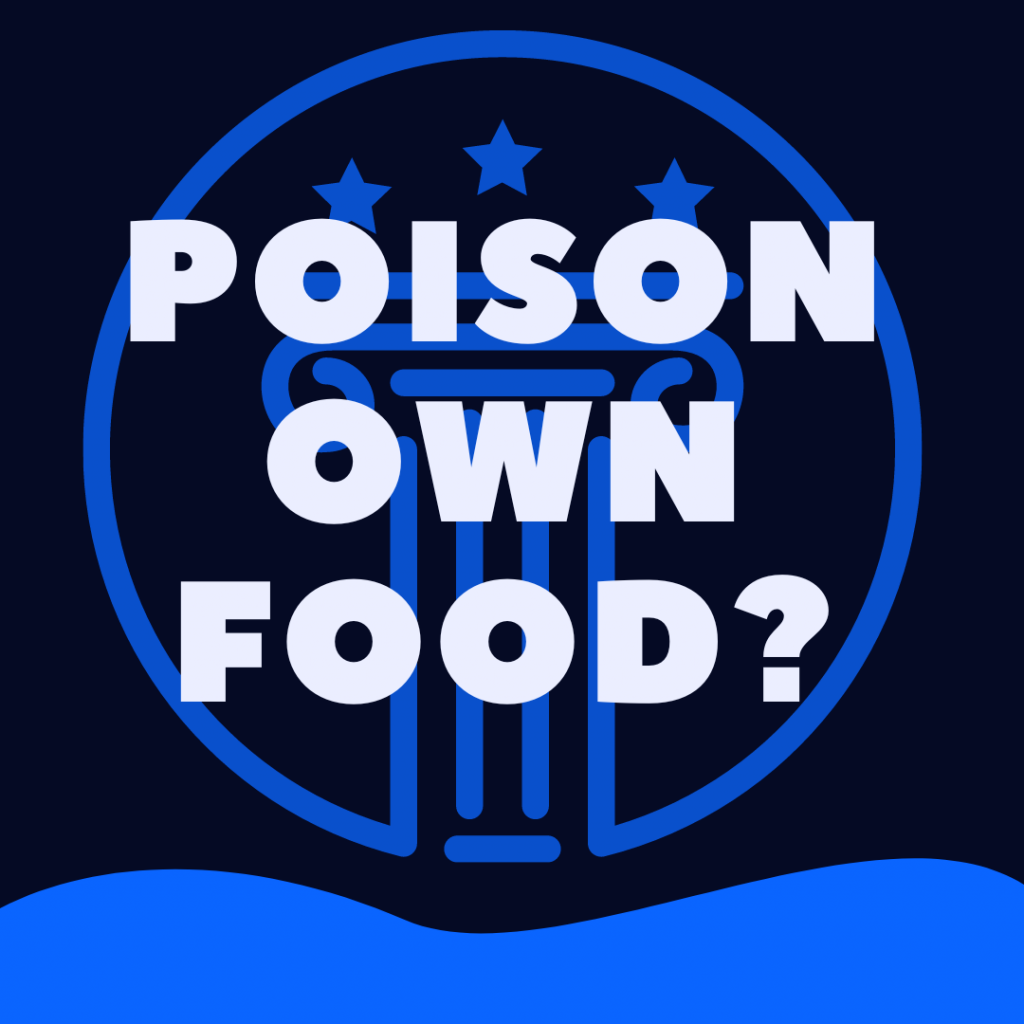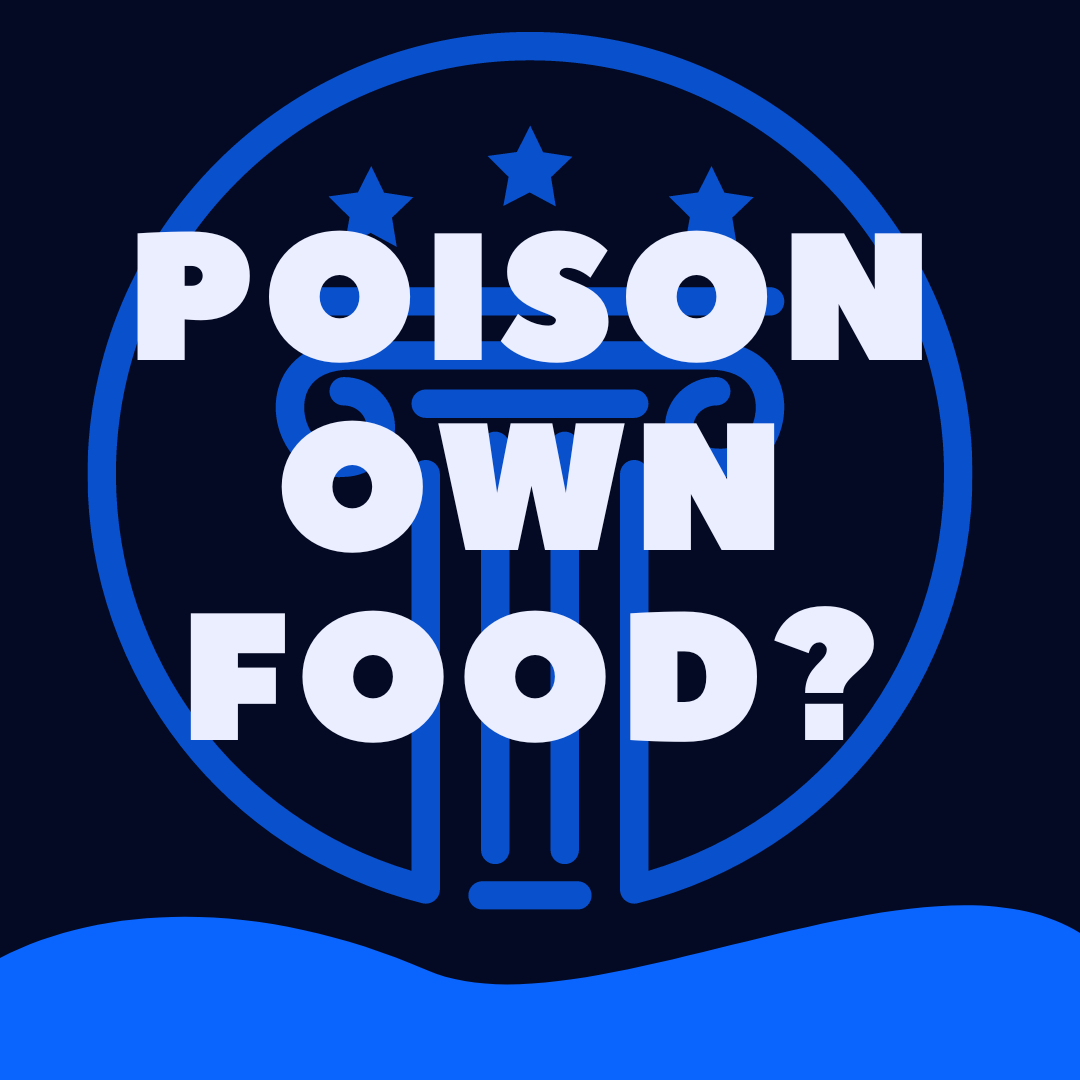Short answer: No, it is not legal to poison your own food if you have any reason to believe that someone else will eat it.
In the article that follows, we’ll explain.
Is It Illegal To Poison Your Own Food? (Discussion)
Disclaimer
The contents of this web page are for informational purposes only, and nothing you read is intended to be legal advice. Please review our disclaimer about law/legal-related information on this website before taking action based upon anything you read or see.
If you’re adding poison to your own food, you might think no harm, no foul. After all, it’s your food, so you can do what you want to it, right? Well, the answer isn’t as simple as you might think.
When you poison your own food, especially with the intention of punishing or warding off thieves, you’re opening yourself up to a host of legal problems bigger than a swiped snack.
While every state’s law is different, some states, like California, have codified laws that prohibit putting poison in food intended for consumption by humans.
This means that even if you try to argue that you are the human whom you intended to consume the food, you’re still not going to get off the hook if someone gets harmed by your poisonous plate of food.
California Penal Code 347 PC confirms that it is illegal in that state to poison medicine, drink, food, or even the water supply that the person poisoning it knows will be ingested by people.
The full language of the statute reads:
347. (a) (1) Every person who willfully mingles any poison or harmful substance with any food, drink, medicine, or pharmaceutical product or who willfully places any poison or harmful substance in any spring, well, reservoir, or public water supply, where the person knows or should have known that the same would be taken by any human being to his or her injury, is guilty of a felony punishable by imprisonment in the state prison for two, four, or five years.
(2) Any violation of paragraph (1) involving the use of a poison or harmful substance that may cause death if ingested or that causes the infliction of great bodily injury on any person shall be punished by an additional term of three years.
(b) Any person who maliciously informs any other person that a poison or other harmful substance has been or will be placed in any food, drink, medicine, pharmaceutical product, or public water supply, knowing that such report is false, is guilty of a crime punishable by imprisonment in the state prison, or by imprisonment in the county jail not to exceed one year.”
As you can see, there is very little wiggle room for defending such an act.
While there are some legal defenses that might work in your favor if you get charged with this crime, they aren’t guaranteed to work.
At the end of the day, if you’re poisoning your own food to deter thieves, you are guilty of this crime whether you feel it was justified or not.
What is the punishment for poisoning your own food to punish thieves?
While different states may have their own sentencing guidelines, the punishment for poisoning food is not a light one.
It’s no slap on the wrist even if you didn’t mean to hurt someone.
Most states in the United States punish poisoning with fines, jail time, prison time, and a felony record.
Some states, such as California’s legal system, take poisoning food, whether it’s yours or another person’s food, very seriously.
In fact, they consider it a felony, which could mean five or more years of prison time depending on the outcome for the victim.
Obviously, significant injuries and lethal poisoning will have greater consequences than poisoning that doesn’t affect the victim physically. Still, the risk outweighs the reward in this case.
How can you stop people from stealing your food?
If you want people to stop stealing your food, you don’t need to fight fire with fire or get a felony for doing it.
Some common ways to discourage food theft include labeling every item of food with your name, especially if you are using a common fridge and keeping your food in an assigned area.
Even the best of roommates or coworkers might forget what they brought to work or home sometimes.
If you and the other people sharing your fridge get the same yogurt, it’s almost impossible to prove that it was your yogurt that they ate.
To avoid confusion, take the time to label any food that will spend time in a common fridge. If you don’t label your food, it might not be stealing; it could just be an honest mistake.
Still, once you’ve marked all of your containers, you’ll have a willfully ignorant roommate or coworker on your hands if they still steal food.
At that point, you can confront them with solid evidence that they knew what they were doing was wrong.
If you divide shared fridges into sections, everyone will know who’s food is where. This means that if you have a coworker stealing your food, you’ll have witnesses who see that your food was stolen.
You can also package food in opaque containers. This way, no one will be tempted by a delicious-looking leftover steak.
They will have to go the extra mile by opening containers to see what’s inside, which might seem like too much effort for someone too lazy to get their own food.
Finally, you can either hide your food in places where no one will look or purchase containers that lock to really crack down on theft.
You’ll want to remember the lock combination or keep the key on hand to avoid getting locked out of your own food. Still, if desperate times call for desperate measures, there are methods that will work.
In conclusion
In most states, it is illegal to poison your own food to punish thieves.
Even if you don’t intend to hurt anyone, the law only cares when someone gets hurt in this kind of situation.
If you want to keep thieves out of your food, label your food, hide it, or lock it away unless you are okay with risking prison time and hefty fines.
Want to learn more about your justice system?
Browse our free legal library guides for more information.
You might also like:
- Are Diving Boards Illegal in California?
- Is It Illegal To Name Your Child God?
- Is It Illegal To Flip off a Cop?
- It it Illegal To Be Friends With a Minor?
- Is It Illegal To Post Screenshots of Conversations?
- Is It Illegal To Use Diesel to Kill Weeds?
- Is It Illegal To use Neighbor’s Wi-Fi?
- Is It Illegal To Use a Fire Hydrant?
- Is It Illegal To Name Your Child Adolf?
- Is It Illegal To Use Someone Else’s Address For School?



